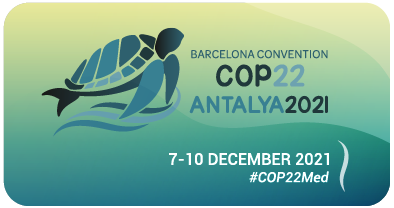Search
12/21: Barcelona Convention COP 22 adopts bold measures for biodiversity conservation and natural resources sustainable use in the Mediterranean
Branded the “COP for the Mediterranean”, the Barcelona Convention COP 22, held in Antalya, Turkey, from 7 to 10 Dec. 2021, adopted a set of action-oriented decisions to accelerate conservation of marine & coastal environment & support sustainable development.
The Contracting Parties to the Convention for the Protection of the Marine Environment and the Coastal Region of the Mediterranean (Barcelona Convention) and its Protocols concluded their 22nd meeting (COP 22, Antalya, Turkey, 7-10 December 2021) with a set of action-oriented decisions for biodiversity conservation.
“There is a wealth of solutions that can be built upon to halt biodiversity decline. But for this to work, the political will is the utmost condition. Through the adoption of bold decisions and the Antalya Declaration, the countries emphasized their support for the collective effort within the framework of the UNEP/MAP-Barcelona Convention system to achieve a healthy Mediterranean Sea and coast in the context of sustainable development”, Khalil Attia, SPA/RAC Director.
The COP 22 adopted notably the Post-2020 Strategic Action Programme for the Conservation of Biodiversity and Sustainable Management of Natural Resources in the Mediterranean Region (Post-2020 SAPBIO). “The Post-2020 SAPBIO is a strong achievement for the Contracting Parties to the Barcelona Convention. It constitutes the blueprint for the conservation of the Mediterranean for the next 15 years.”, Daniel Cebrian, SAPBIO Programme Officer, SPA/RAC.

The Post-2020 SAPBIO proposes a long-term Vision to 2050, adapted from the Global Biodiversity Framework to be finalized in 2022 under the UNCBD: “By 2050, marine and coastal biodiversity is valued, conserved, restored and wisely used, maintaining ecosystem services, sustaining a healthy Mediterranean Sea and coast, and delivering benefits essential for all people”.
Developed by UNEP/MAP-SPA/RAC following a fully participative regional bottom-up process, the Post-2020 SAPBIO proposes activities tailored towards realistic objectives and targets that countries could reasonably achieve with the coordination of relevant international organisations and the support of donors and funding agencies.
The Post-2020 SAPBIO is complemented by other measures, also adopted by COP 22, which should contribute to achieving conservation goals in the region.
These include the Post-2020 Regional Strategy for marine and coastal protected areas and other effective area-based conservation measures in the Mediterranean (Post-2020 MCPA & OECM Strategy). “It is an important document that would bring the Mediterranean to meet global CBD objectives. For the time being, we are far away from the 30% protection coverage by 2030. So far, we are at 8,33% of marine protected areas coverage in 2020”, Souha El Asmi, Specially Protected Areas Programme Officer, SPA/RAC.

The Post-2020 MCPA & OECM Strategy sets key actions to increase the protection coverage, including through the identification and reporting of “other effective area-based conservation measures” (OECMs). The proposed actions also aim to enhance governance within MPAs, improve their management effectiveness, and provide guidance on how to engage governments and other stakeholders to make MPAs successful.
A new initiative, adopted by COP 22, will further promote MPAs as an important tool for biodiversity conservation and management. From 2022, the celebration of the Specially Protected Areas of Mediterranean Importance Day (SPAMI Day) will take place on 15 April each year.
On species and habitats conservation, COP 22 adopted two updated Action Plans for the conservation of cetaceans and dark habitats under the Protocol concerning Specially Protected Areas and Biological Diversity in the Mediterranean. The updates aimed notably to strengthen the regional and national efforts and actions as well as the coordination and synergies among the conservation stakeholders in the region.
This year's COP 22 marked 45 years of regional cooperation dedicated to the marine and coastal environment and sustainable development in the framework of the Barcelona Convention. Over 400 participants from Contracting Parties and representatives from UN agencies, intergovernmental and non-governmental organizations, research institutions, donors, the private sector, and civil society organizations attended the four-day meeting. A number of side events took place on the sidelines of the COP and were an opportunity to share the best conservation initiatives, in the spirit of sharing/exchanging in a collaborative spirit.
- For more information on COP 22 Antalya: https://www.unep.org/unepmap/events/meeting/COP22-Barcelona-Convention-Mediterranean
- IISD/Earth Negotiations Bulletin’s coverage of COP 22 (including photos, videos and daily summaries): https://enb.iisd.org/Barcelona-Convention-COP22

Family photo at the end of COP 22 by IISD/ENB




Suivez nous sur ...